NURS 510 Report: Analysis of Pandemic and All-Hazards Preparedness Act
VerifiedAdded on 2023/03/29
|7
|1329
|53
Report
AI Summary
This report provides an overview and analysis of the Pandemic and All-Hazards Preparedness and Advancing Innovation Act, a bill proposed by Senator Richard Burr aimed at reauthorizing programs under the Public Health Service Act and the Federal Food, Drug, and Cosmetic Act to enhance public health security and all-hazards preparedness. The report details the background and political involvement of Senator Burr, including his committee memberships and sponsored bills. It summarizes the legislator’s current policy agenda, focusing on improvements to public health security through federal funding for programs addressing pandemics and antimicrobial resistance, with specific attention to vulnerable populations and the formation of advisory councils. The report also investigates answers to key interview questions regarding the policy's objectives, improvements over previous acts, and the roles of stakeholders, highlighting the policy's aim to correct past preparedness failures, fund research for drug-resistant pathogens, and engage scientific experts and governmental agencies in mitigating bioterrorism risks. The report references various government and scholarly sources to support its analysis.
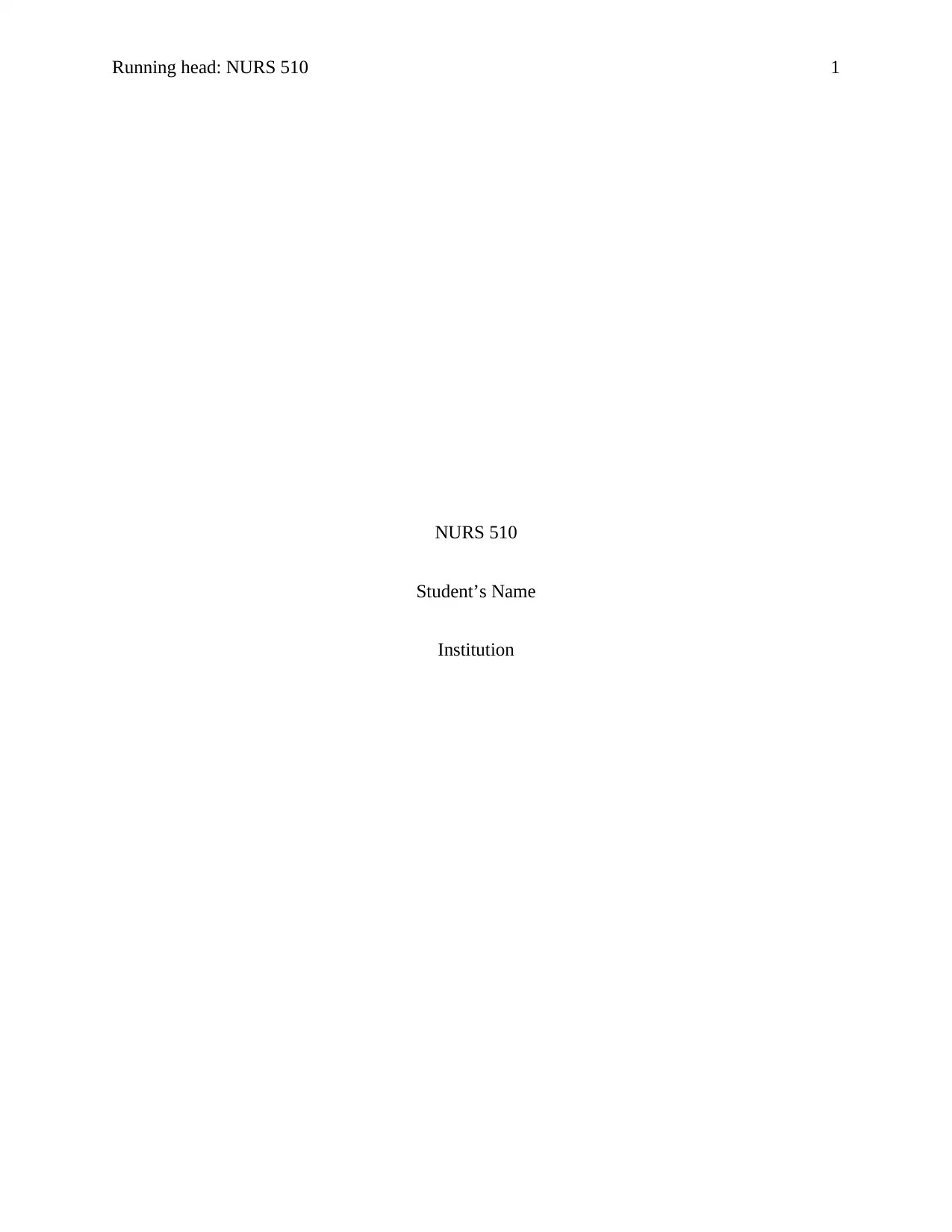
Running head: NURS 510 1
NURS 510
Student’s Name
Institution
NURS 510
Student’s Name
Institution
Paraphrase This Document
Need a fresh take? Get an instant paraphrase of this document with our AI Paraphraser
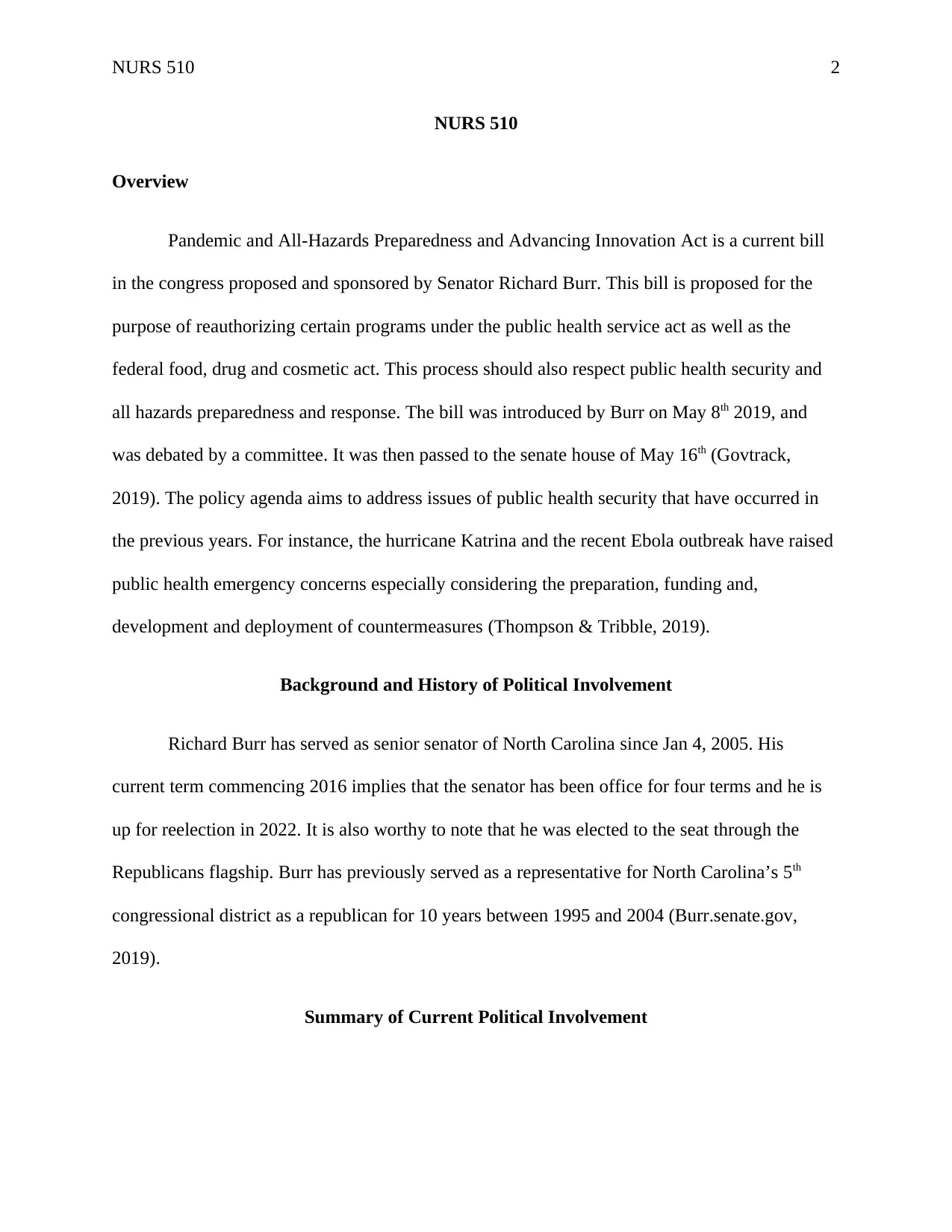
NURS 510 2
NURS 510
Overview
Pandemic and All-Hazards Preparedness and Advancing Innovation Act is a current bill
in the congress proposed and sponsored by Senator Richard Burr. This bill is proposed for the
purpose of reauthorizing certain programs under the public health service act as well as the
federal food, drug and cosmetic act. This process should also respect public health security and
all hazards preparedness and response. The bill was introduced by Burr on May 8th 2019, and
was debated by a committee. It was then passed to the senate house of May 16th (Govtrack,
2019). The policy agenda aims to address issues of public health security that have occurred in
the previous years. For instance, the hurricane Katrina and the recent Ebola outbreak have raised
public health emergency concerns especially considering the preparation, funding and,
development and deployment of countermeasures (Thompson & Tribble, 2019).
Background and History of Political Involvement
Richard Burr has served as senior senator of North Carolina since Jan 4, 2005. His
current term commencing 2016 implies that the senator has been office for four terms and he is
up for reelection in 2022. It is also worthy to note that he was elected to the seat through the
Republicans flagship. Burr has previously served as a representative for North Carolina’s 5th
congressional district as a republican for 10 years between 1995 and 2004 (Burr.senate.gov,
2019).
Summary of Current Political Involvement
NURS 510
Overview
Pandemic and All-Hazards Preparedness and Advancing Innovation Act is a current bill
in the congress proposed and sponsored by Senator Richard Burr. This bill is proposed for the
purpose of reauthorizing certain programs under the public health service act as well as the
federal food, drug and cosmetic act. This process should also respect public health security and
all hazards preparedness and response. The bill was introduced by Burr on May 8th 2019, and
was debated by a committee. It was then passed to the senate house of May 16th (Govtrack,
2019). The policy agenda aims to address issues of public health security that have occurred in
the previous years. For instance, the hurricane Katrina and the recent Ebola outbreak have raised
public health emergency concerns especially considering the preparation, funding and,
development and deployment of countermeasures (Thompson & Tribble, 2019).
Background and History of Political Involvement
Richard Burr has served as senior senator of North Carolina since Jan 4, 2005. His
current term commencing 2016 implies that the senator has been office for four terms and he is
up for reelection in 2022. It is also worthy to note that he was elected to the seat through the
Republicans flagship. Burr has previously served as a representative for North Carolina’s 5th
congressional district as a republican for 10 years between 1995 and 2004 (Burr.senate.gov,
2019).
Summary of Current Political Involvement
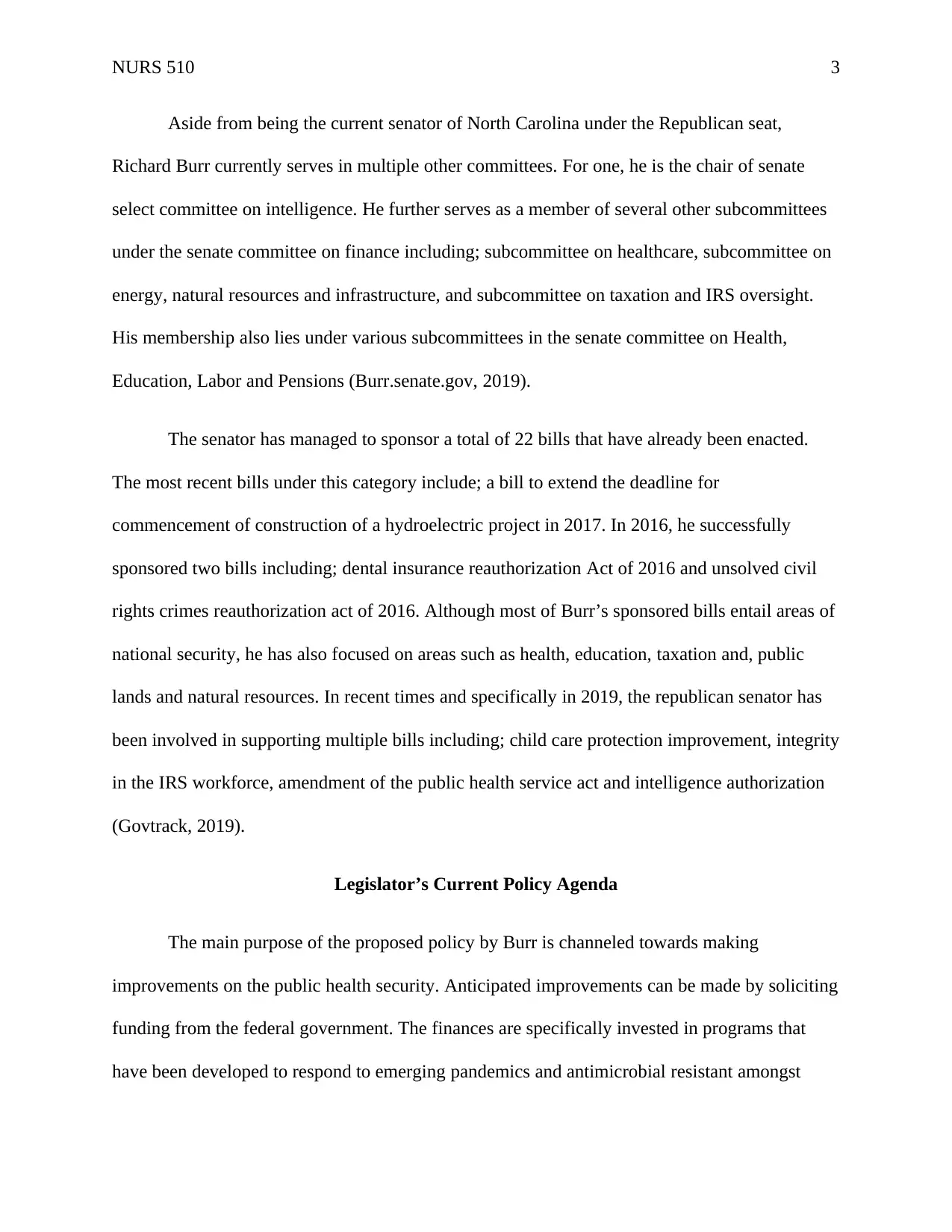
NURS 510 3
Aside from being the current senator of North Carolina under the Republican seat,
Richard Burr currently serves in multiple other committees. For one, he is the chair of senate
select committee on intelligence. He further serves as a member of several other subcommittees
under the senate committee on finance including; subcommittee on healthcare, subcommittee on
energy, natural resources and infrastructure, and subcommittee on taxation and IRS oversight.
His membership also lies under various subcommittees in the senate committee on Health,
Education, Labor and Pensions (Burr.senate.gov, 2019).
The senator has managed to sponsor a total of 22 bills that have already been enacted.
The most recent bills under this category include; a bill to extend the deadline for
commencement of construction of a hydroelectric project in 2017. In 2016, he successfully
sponsored two bills including; dental insurance reauthorization Act of 2016 and unsolved civil
rights crimes reauthorization act of 2016. Although most of Burr’s sponsored bills entail areas of
national security, he has also focused on areas such as health, education, taxation and, public
lands and natural resources. In recent times and specifically in 2019, the republican senator has
been involved in supporting multiple bills including; child care protection improvement, integrity
in the IRS workforce, amendment of the public health service act and intelligence authorization
(Govtrack, 2019).
Legislator’s Current Policy Agenda
The main purpose of the proposed policy by Burr is channeled towards making
improvements on the public health security. Anticipated improvements can be made by soliciting
funding from the federal government. The finances are specifically invested in programs that
have been developed to respond to emerging pandemics and antimicrobial resistant amongst
Aside from being the current senator of North Carolina under the Republican seat,
Richard Burr currently serves in multiple other committees. For one, he is the chair of senate
select committee on intelligence. He further serves as a member of several other subcommittees
under the senate committee on finance including; subcommittee on healthcare, subcommittee on
energy, natural resources and infrastructure, and subcommittee on taxation and IRS oversight.
His membership also lies under various subcommittees in the senate committee on Health,
Education, Labor and Pensions (Burr.senate.gov, 2019).
The senator has managed to sponsor a total of 22 bills that have already been enacted.
The most recent bills under this category include; a bill to extend the deadline for
commencement of construction of a hydroelectric project in 2017. In 2016, he successfully
sponsored two bills including; dental insurance reauthorization Act of 2016 and unsolved civil
rights crimes reauthorization act of 2016. Although most of Burr’s sponsored bills entail areas of
national security, he has also focused on areas such as health, education, taxation and, public
lands and natural resources. In recent times and specifically in 2019, the republican senator has
been involved in supporting multiple bills including; child care protection improvement, integrity
in the IRS workforce, amendment of the public health service act and intelligence authorization
(Govtrack, 2019).
Legislator’s Current Policy Agenda
The main purpose of the proposed policy by Burr is channeled towards making
improvements on the public health security. Anticipated improvements can be made by soliciting
funding from the federal government. The finances are specifically invested in programs that
have been developed to respond to emerging pandemics and antimicrobial resistant amongst
⊘ This is a preview!⊘
Do you want full access?
Subscribe today to unlock all pages.

Trusted by 1+ million students worldwide
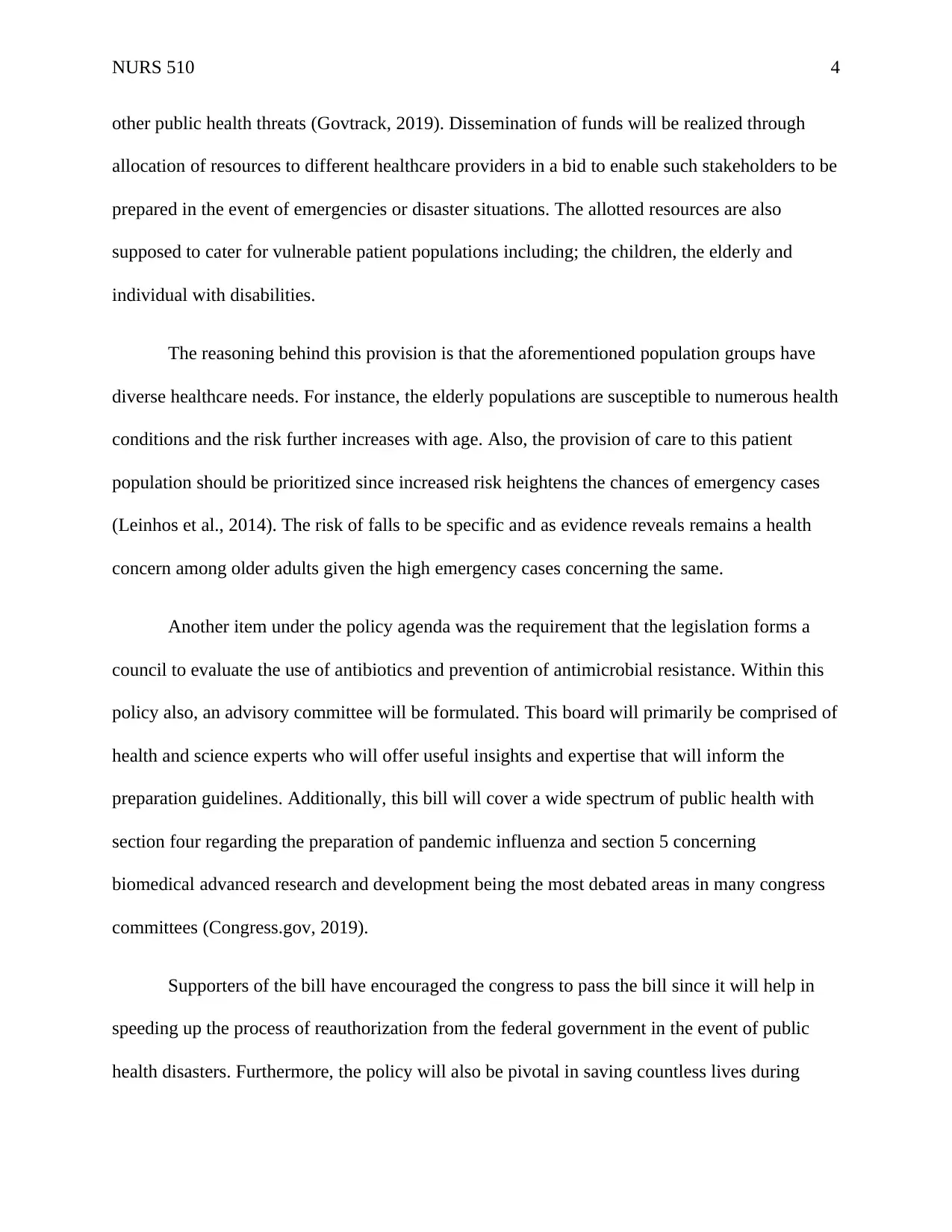
NURS 510 4
other public health threats (Govtrack, 2019). Dissemination of funds will be realized through
allocation of resources to different healthcare providers in a bid to enable such stakeholders to be
prepared in the event of emergencies or disaster situations. The allotted resources are also
supposed to cater for vulnerable patient populations including; the children, the elderly and
individual with disabilities.
The reasoning behind this provision is that the aforementioned population groups have
diverse healthcare needs. For instance, the elderly populations are susceptible to numerous health
conditions and the risk further increases with age. Also, the provision of care to this patient
population should be prioritized since increased risk heightens the chances of emergency cases
(Leinhos et al., 2014). The risk of falls to be specific and as evidence reveals remains a health
concern among older adults given the high emergency cases concerning the same.
Another item under the policy agenda was the requirement that the legislation forms a
council to evaluate the use of antibiotics and prevention of antimicrobial resistance. Within this
policy also, an advisory committee will be formulated. This board will primarily be comprised of
health and science experts who will offer useful insights and expertise that will inform the
preparation guidelines. Additionally, this bill will cover a wide spectrum of public health with
section four regarding the preparation of pandemic influenza and section 5 concerning
biomedical advanced research and development being the most debated areas in many congress
committees (Congress.gov, 2019).
Supporters of the bill have encouraged the congress to pass the bill since it will help in
speeding up the process of reauthorization from the federal government in the event of public
health disasters. Furthermore, the policy will also be pivotal in saving countless lives during
other public health threats (Govtrack, 2019). Dissemination of funds will be realized through
allocation of resources to different healthcare providers in a bid to enable such stakeholders to be
prepared in the event of emergencies or disaster situations. The allotted resources are also
supposed to cater for vulnerable patient populations including; the children, the elderly and
individual with disabilities.
The reasoning behind this provision is that the aforementioned population groups have
diverse healthcare needs. For instance, the elderly populations are susceptible to numerous health
conditions and the risk further increases with age. Also, the provision of care to this patient
population should be prioritized since increased risk heightens the chances of emergency cases
(Leinhos et al., 2014). The risk of falls to be specific and as evidence reveals remains a health
concern among older adults given the high emergency cases concerning the same.
Another item under the policy agenda was the requirement that the legislation forms a
council to evaluate the use of antibiotics and prevention of antimicrobial resistance. Within this
policy also, an advisory committee will be formulated. This board will primarily be comprised of
health and science experts who will offer useful insights and expertise that will inform the
preparation guidelines. Additionally, this bill will cover a wide spectrum of public health with
section four regarding the preparation of pandemic influenza and section 5 concerning
biomedical advanced research and development being the most debated areas in many congress
committees (Congress.gov, 2019).
Supporters of the bill have encouraged the congress to pass the bill since it will help in
speeding up the process of reauthorization from the federal government in the event of public
health disasters. Furthermore, the policy will also be pivotal in saving countless lives during
Paraphrase This Document
Need a fresh take? Get an instant paraphrase of this document with our AI Paraphraser
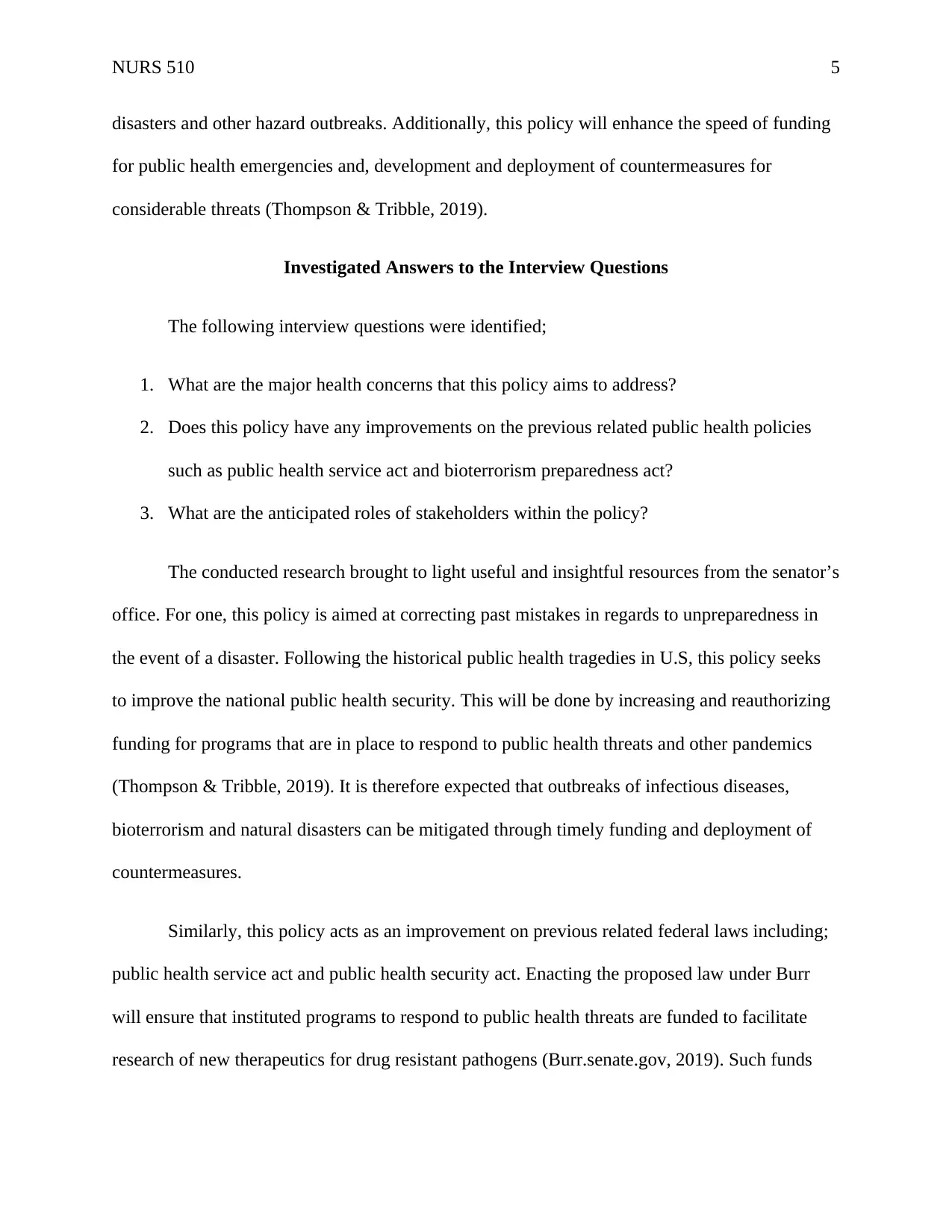
NURS 510 5
disasters and other hazard outbreaks. Additionally, this policy will enhance the speed of funding
for public health emergencies and, development and deployment of countermeasures for
considerable threats (Thompson & Tribble, 2019).
Investigated Answers to the Interview Questions
The following interview questions were identified;
1. What are the major health concerns that this policy aims to address?
2. Does this policy have any improvements on the previous related public health policies
such as public health service act and bioterrorism preparedness act?
3. What are the anticipated roles of stakeholders within the policy?
The conducted research brought to light useful and insightful resources from the senator’s
office. For one, this policy is aimed at correcting past mistakes in regards to unpreparedness in
the event of a disaster. Following the historical public health tragedies in U.S, this policy seeks
to improve the national public health security. This will be done by increasing and reauthorizing
funding for programs that are in place to respond to public health threats and other pandemics
(Thompson & Tribble, 2019). It is therefore expected that outbreaks of infectious diseases,
bioterrorism and natural disasters can be mitigated through timely funding and deployment of
countermeasures.
Similarly, this policy acts as an improvement on previous related federal laws including;
public health service act and public health security act. Enacting the proposed law under Burr
will ensure that instituted programs to respond to public health threats are funded to facilitate
research of new therapeutics for drug resistant pathogens (Burr.senate.gov, 2019). Such funds
disasters and other hazard outbreaks. Additionally, this policy will enhance the speed of funding
for public health emergencies and, development and deployment of countermeasures for
considerable threats (Thompson & Tribble, 2019).
Investigated Answers to the Interview Questions
The following interview questions were identified;
1. What are the major health concerns that this policy aims to address?
2. Does this policy have any improvements on the previous related public health policies
such as public health service act and bioterrorism preparedness act?
3. What are the anticipated roles of stakeholders within the policy?
The conducted research brought to light useful and insightful resources from the senator’s
office. For one, this policy is aimed at correcting past mistakes in regards to unpreparedness in
the event of a disaster. Following the historical public health tragedies in U.S, this policy seeks
to improve the national public health security. This will be done by increasing and reauthorizing
funding for programs that are in place to respond to public health threats and other pandemics
(Thompson & Tribble, 2019). It is therefore expected that outbreaks of infectious diseases,
bioterrorism and natural disasters can be mitigated through timely funding and deployment of
countermeasures.
Similarly, this policy acts as an improvement on previous related federal laws including;
public health service act and public health security act. Enacting the proposed law under Burr
will ensure that instituted programs to respond to public health threats are funded to facilitate
research of new therapeutics for drug resistant pathogens (Burr.senate.gov, 2019). Such funds
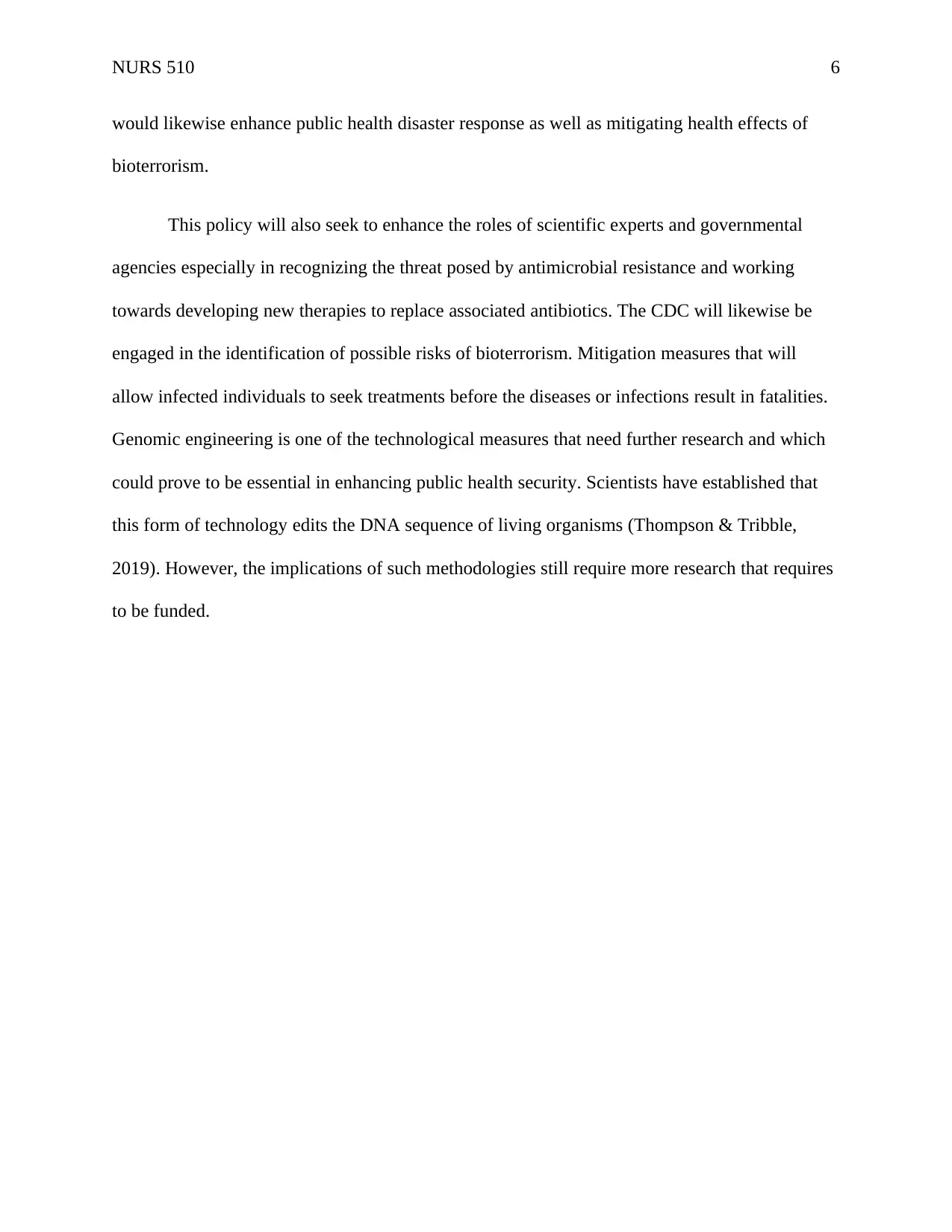
NURS 510 6
would likewise enhance public health disaster response as well as mitigating health effects of
bioterrorism.
This policy will also seek to enhance the roles of scientific experts and governmental
agencies especially in recognizing the threat posed by antimicrobial resistance and working
towards developing new therapies to replace associated antibiotics. The CDC will likewise be
engaged in the identification of possible risks of bioterrorism. Mitigation measures that will
allow infected individuals to seek treatments before the diseases or infections result in fatalities.
Genomic engineering is one of the technological measures that need further research and which
could prove to be essential in enhancing public health security. Scientists have established that
this form of technology edits the DNA sequence of living organisms (Thompson & Tribble,
2019). However, the implications of such methodologies still require more research that requires
to be funded.
would likewise enhance public health disaster response as well as mitigating health effects of
bioterrorism.
This policy will also seek to enhance the roles of scientific experts and governmental
agencies especially in recognizing the threat posed by antimicrobial resistance and working
towards developing new therapies to replace associated antibiotics. The CDC will likewise be
engaged in the identification of possible risks of bioterrorism. Mitigation measures that will
allow infected individuals to seek treatments before the diseases or infections result in fatalities.
Genomic engineering is one of the technological measures that need further research and which
could prove to be essential in enhancing public health security. Scientists have established that
this form of technology edits the DNA sequence of living organisms (Thompson & Tribble,
2019). However, the implications of such methodologies still require more research that requires
to be funded.
⊘ This is a preview!⊘
Do you want full access?
Subscribe today to unlock all pages.

Trusted by 1+ million students worldwide
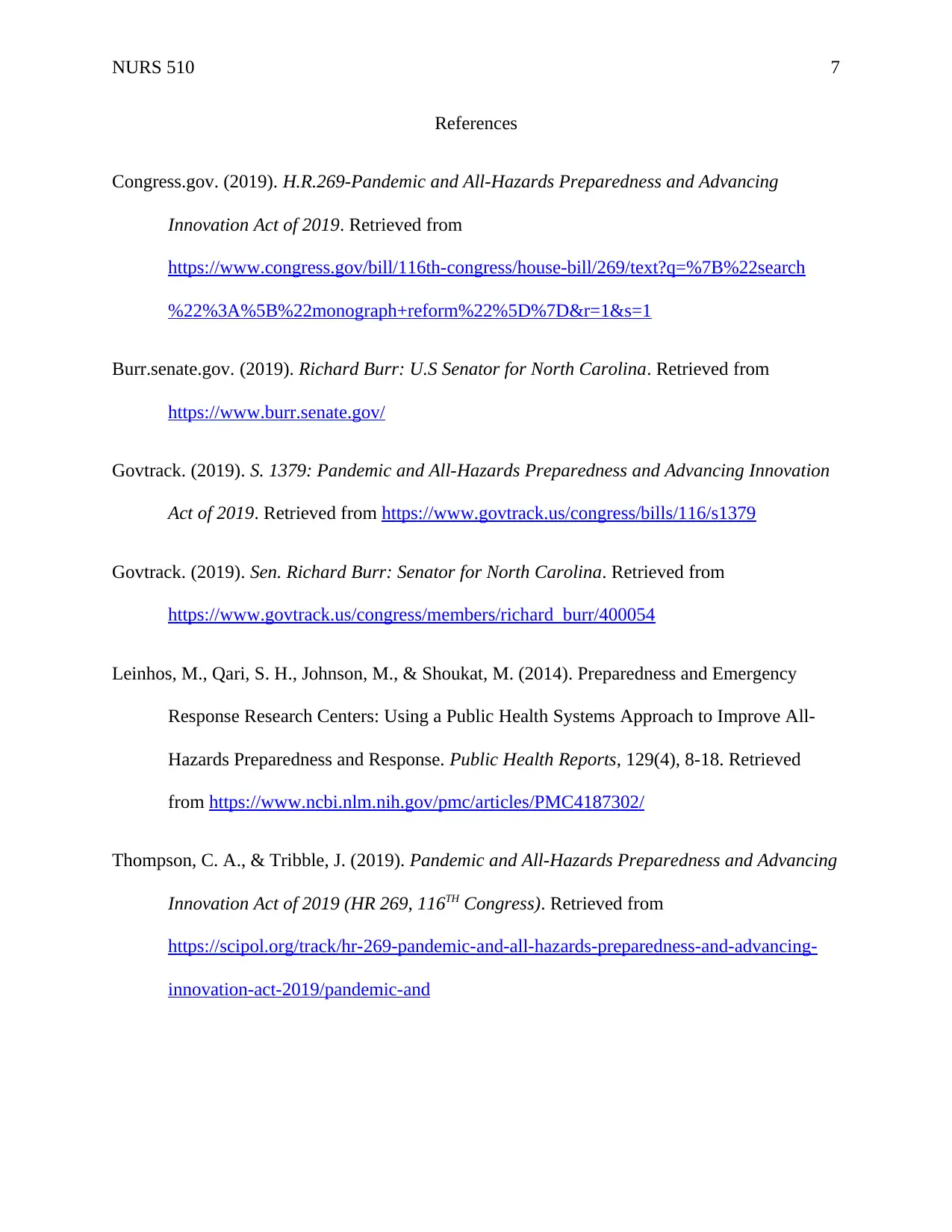
NURS 510 7
References
Congress.gov. (2019). H.R.269-Pandemic and All-Hazards Preparedness and Advancing
Innovation Act of 2019. Retrieved from
https://www.congress.gov/bill/116th-congress/house-bill/269/text?q=%7B%22search
%22%3A%5B%22monograph+reform%22%5D%7D&r=1&s=1
Burr.senate.gov. (2019). Richard Burr: U.S Senator for North Carolina. Retrieved from
https://www.burr.senate.gov/
Govtrack. (2019). S. 1379: Pandemic and All-Hazards Preparedness and Advancing Innovation
Act of 2019. Retrieved from https://www.govtrack.us/congress/bills/116/s1379
Govtrack. (2019). Sen. Richard Burr: Senator for North Carolina. Retrieved from
https://www.govtrack.us/congress/members/richard_burr/400054
Leinhos, M., Qari, S. H., Johnson, M., & Shoukat, M. (2014). Preparedness and Emergency
Response Research Centers: Using a Public Health Systems Approach to Improve All-
Hazards Preparedness and Response. Public Health Reports, 129(4), 8-18. Retrieved
from https://www.ncbi.nlm.nih.gov/pmc/articles/PMC4187302/
Thompson, C. A., & Tribble, J. (2019). Pandemic and All-Hazards Preparedness and Advancing
Innovation Act of 2019 (HR 269, 116TH Congress). Retrieved from
https://scipol.org/track/hr-269-pandemic-and-all-hazards-preparedness-and-advancing-
innovation-act-2019/pandemic-and
References
Congress.gov. (2019). H.R.269-Pandemic and All-Hazards Preparedness and Advancing
Innovation Act of 2019. Retrieved from
https://www.congress.gov/bill/116th-congress/house-bill/269/text?q=%7B%22search
%22%3A%5B%22monograph+reform%22%5D%7D&r=1&s=1
Burr.senate.gov. (2019). Richard Burr: U.S Senator for North Carolina. Retrieved from
https://www.burr.senate.gov/
Govtrack. (2019). S. 1379: Pandemic and All-Hazards Preparedness and Advancing Innovation
Act of 2019. Retrieved from https://www.govtrack.us/congress/bills/116/s1379
Govtrack. (2019). Sen. Richard Burr: Senator for North Carolina. Retrieved from
https://www.govtrack.us/congress/members/richard_burr/400054
Leinhos, M., Qari, S. H., Johnson, M., & Shoukat, M. (2014). Preparedness and Emergency
Response Research Centers: Using a Public Health Systems Approach to Improve All-
Hazards Preparedness and Response. Public Health Reports, 129(4), 8-18. Retrieved
from https://www.ncbi.nlm.nih.gov/pmc/articles/PMC4187302/
Thompson, C. A., & Tribble, J. (2019). Pandemic and All-Hazards Preparedness and Advancing
Innovation Act of 2019 (HR 269, 116TH Congress). Retrieved from
https://scipol.org/track/hr-269-pandemic-and-all-hazards-preparedness-and-advancing-
innovation-act-2019/pandemic-and
1 out of 7
Your All-in-One AI-Powered Toolkit for Academic Success.
+13062052269
info@desklib.com
Available 24*7 on WhatsApp / Email
![[object Object]](/_next/static/media/star-bottom.7253800d.svg)
Unlock your academic potential
Copyright © 2020–2025 A2Z Services. All Rights Reserved. Developed and managed by ZUCOL.